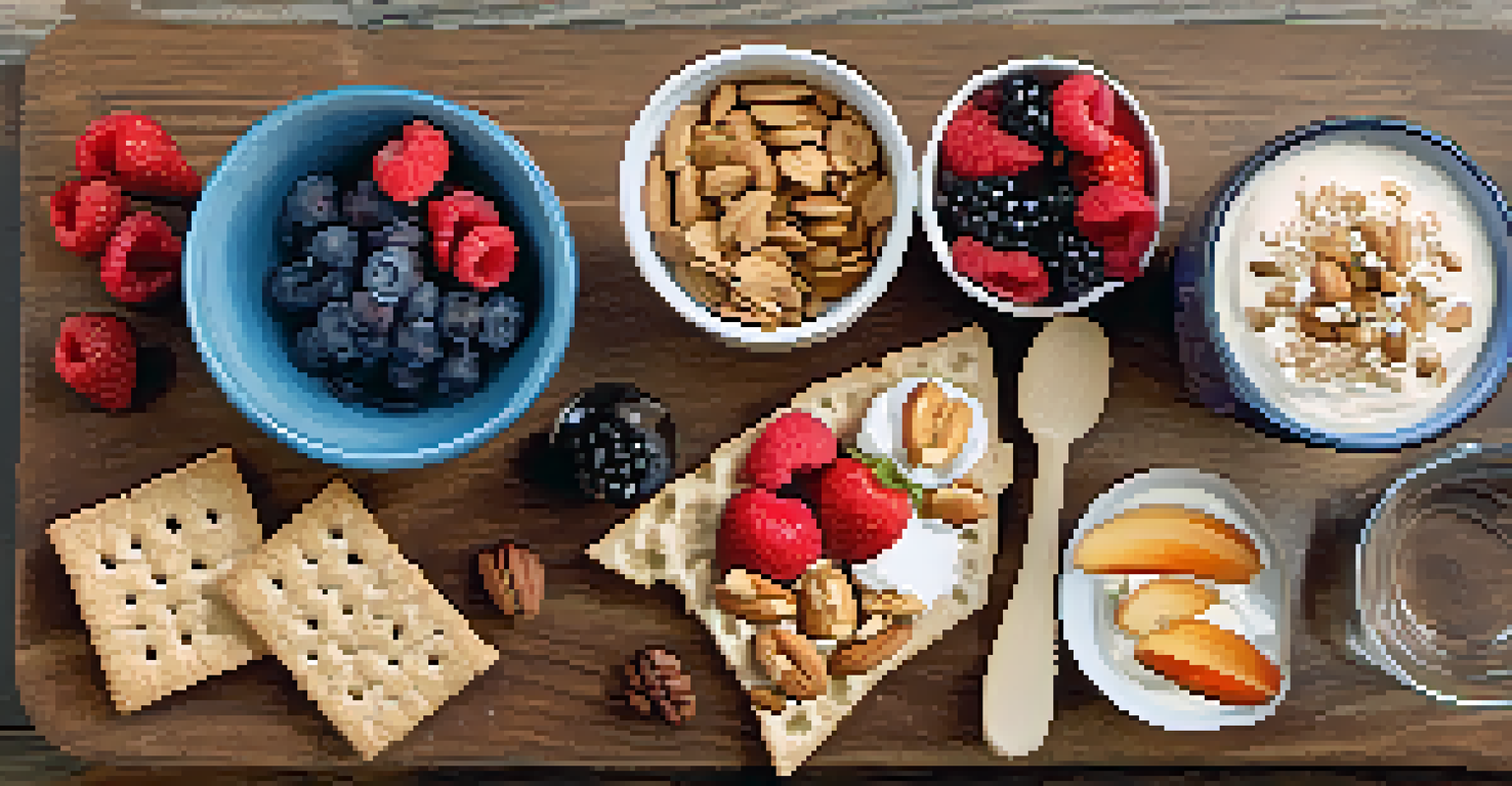Cooking for Energy: Nutritional Techniques for Active Lifestyles

Understanding the Role of Nutrition in Energy Levels
Nutrition plays a pivotal role in our energy levels, acting as the foundation for an active lifestyle. Just like a car needs fuel to run, our bodies require the right nutrients to power through daily activities. Without proper nutrition, you might feel sluggish or tired, making it difficult to keep up with your routine.
Let food be thy medicine and medicine be thy food.
When you eat, your body breaks down food into glucose, which is then used for energy. This process highlights the importance of choosing the right foods—those that provide sustained energy rather than quick spikes followed by crashes. Thus, understanding how different nutrients affect energy can help you make better food choices.
Incorporating balanced meals that include proteins, healthy fats, and carbohydrates can significantly enhance your stamina. Think of your meals as a well-oiled machine, where each nutrient plays a role in keeping everything running smoothly.
Essential Nutrients for Boosting Energy Levels
To maintain high energy levels, it's crucial to focus on essential nutrients. Carbohydrates are the body's primary energy source, especially for those engaging in physical activities. Opt for whole grains, fruits, and vegetables, as they provide the necessary fuel while also supplying fiber and vitamins.

Proteins are equally important, as they help repair and build muscle tissue, which is vital for active individuals. Incorporating lean meats, legumes, and dairy products can help ensure you're getting enough protein. Meanwhile, healthy fats from sources like avocados and nuts provide long-lasting energy, making them perfect for sustained activities.
Nutrition Fuels Energy Levels
Choosing the right nutrients, like carbohydrates, proteins, and healthy fats, is essential for maintaining energy throughout the day.
Vitamins and minerals also play a key role in energy production and metabolism. For instance, B vitamins are essential for converting food into energy, while iron helps transport oxygen in the blood. A diverse diet rich in various foods can help you meet these nutritional needs effectively.
Meal Timing: When to Eat for Optimal Energy
Meal timing can significantly impact your energy levels throughout the day. Eating regular meals and snacks helps maintain stable blood sugar levels, preventing those dreaded energy crashes. For active individuals, it’s important to fuel up before and after workouts to maximize performance and recovery.
You are what you eat, so don't be fast, cheap, easy, or fake.
Before a workout, aim for a meal that includes carbohydrates and some protein about 1-3 hours in advance. This allows your body to convert the food into energy efficiently. Post-exercise, focus on a mix of protein and carbs to replenish glycogen stores and support muscle repair.
Listening to your body's hunger cues is also essential. Rather than adhering to strict meal times, try to eat when you're hungry and choose nutrient-dense options. This flexibility can enhance energy levels and overall well-being.
Hydration: The Often Overlooked Energy Booster
Hydration is a crucial aspect of maintaining energy levels, yet it’s often overlooked. Dehydration can lead to fatigue, decreased performance, and even mood swings. Therefore, ensuring you drink enough water throughout the day is key, especially when engaging in physical activities.
A good rule of thumb is to aim for at least eight 8-ounce glasses of water daily, but active individuals may require more. Pay attention to your body—thirst is a clear signal that it’s time to hydrate. You can also incorporate hydrating foods like fruits and vegetables into your diet.
Hydration Boosts Performance
Staying hydrated is crucial for optimal energy levels, as dehydration can lead to fatigue and decreased performance.
Consider your hydration needs based on your activity level and environmental conditions. If you're exercising intensely or in hot weather, electrolytes also become important. Sports drinks or coconut water can help replenish lost minerals, keeping your energy levels optimal.
Snacking Smart: Choosing Energy-Boosting Snacks
Snacking can be a powerful tool for maintaining energy levels throughout the day. Instead of reaching for sugary snacks that can lead to crashes, opt for energy-boosting options that provide lasting fuel. Think of snacks as mini-meals that can help bridge the gap between main meals.
Nuts, Greek yogurt, and whole-grain crackers with hummus are excellent choices that combine protein, healthy fats, and carbohydrates. These snacks not only satisfy hunger but also provide a steady stream of energy, making them perfect for pre- or post-workout fuel.
Always keep some healthy snacks on hand, whether at home, in your bag, or at work. This way, you’re less likely to succumb to unhealthy cravings and can maintain your energy levels throughout the day.
Mindful Eating: Connecting with Your Food
Practicing mindful eating can enhance your relationship with food and improve energy levels. This technique involves paying attention to what you eat, how you eat, and the sensations associated with eating. By slowing down and savoring each bite, you can better gauge your hunger and fullness cues.
Mindful eating also encourages healthier food choices, as you become more aware of how different foods make you feel. Instead of mindlessly snacking while watching TV or working, try to focus on your meal or snack. This awareness can help you appreciate your food and make better decisions.
Smart Snacking Supports Energy
Opting for energy-boosting snacks, such as nuts and Greek yogurt, can help sustain energy between meals.
Ultimately, connecting with your food can lead to a more enjoyable eating experience and help you fuel your body effectively. Remember, eating isn't just about sustenance; it's about nourishing your body and mind.
Creating Balanced Meals for Sustained Energy
Crafting balanced meals is essential for sustaining energy throughout the day. A well-rounded plate typically includes a source of protein, whole grains, and plenty of vegetables. This combination not only provides essential nutrients but also helps keep you feeling fuller for longer.
For example, consider a meal of grilled chicken, quinoa, and a colorful salad. This dish includes lean protein, complex carbohydrates, and a variety of vitamins and minerals, creating a nutritional powerhouse. Plus, the variety of colors on your plate makes it visually appealing and exciting to eat.

Experimenting with different meal combinations can help you discover what works best for your body. Keeping your meals diverse ensures you receive a wide range of nutrients, which is vital for maintaining high energy levels and supporting an active lifestyle.